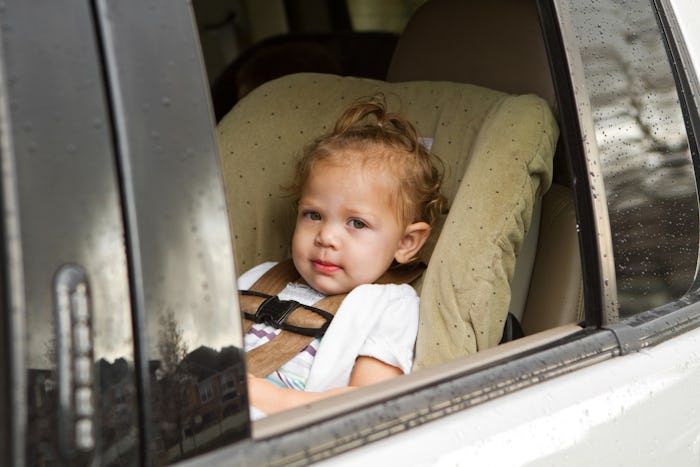Life

Car rides with toddlers are not always the most calm of experiences. Between asking for snacks, throwing said snacks, and wondering incessantly, "Are we there yet?" there isn't much time to relax and enjoy the ride. But, if your tot gets motion sick in the car, car rides can be even more unnerving. For most people, riding in the car to go from place to place is inevitable, so how do you manage a child that gets car sick? Here's how to cure motion sickness in toddlers and hopefully gain more peaceful rides in your future.
According to Dr. Emily Pittman, MD, pediatric hospitalist at Riley Children's Health, if your child starts to develop the symptoms of motion sickness, the best approach is to stop the activity that is causing the problem. "If it occurs in the car," Pittman tells Romper, "stop as soon as safely possible and let him or her get out and walk around. If you are on a long car trip, you may have to make frequent short stops." Sometimes, she notes, giving children a light snack (like crackers) before getting in the vehicle can help, as hungry children tend to have more symptoms of motion sickness.
If you're wondering why motion sickness occurs, the cause of it primarily roots from a sensory mismatch experienced in the brain. When children get motion sick, it's because the brain is receiving conflicting information from the inner ears, eyes, or nerves in their extremities, Pittman explains. "If a child is sitting low in the backseat and not looking out the window, their inner ear will sense movement, but their eyes and sensory nerves do not," she says. "Or, maybe the inner ear is sensing the motion of the car, but your child is reading a book, and thus, not seeing any movement." These sorts of conflict sensory experiences can lead to feeling motion sick.
Toddler motion sickness can present in a variety of ways and the effects of it are different for different children. Some kids might feel dizzy or want to lie down. Others may have a vague feeling of queasiness, fatigue, or loss of appetite.
Of course, since toddlers can't always express how they're feeling, you might have to analyze their actions a bit to find out what's going on. You might see your younger child get more restless, cry often, or frequently yawn, says Pittman. As children get older, nausea and vomitting might be more prevalent.
Because motion sickness is caused largely by mismatched sensory experiences, there are few other things you can do to help ease your toddler's motion sickness in the car, notes Pittman. "It can be helpful to have the child look at things outside the car," she says, as this may help to match up those sensory inputs. Focusing attention away from feeling queasy by singing, talking, and listening to music can also help. Pittman mentions that some families have had success with car trips during nap time or overnight, if at all possible. "If the child is sleeping, there is no conflicting sensory information from the eyes."
If you are going on a trip and your child has experienced motion sickness before that has not been relieved from the suggestions above, you might want to talk to your pediatrician to consider medication or other options. Some medications, like Dramamine and Benadryl, are available for older children without a prescription, but ask your pediatrician before using them. "Although they can help," Pittman tells Romper, "they can also produce side effects, such as drowsiness, dry mouth and nose, or blurred vision." It's always best to speak with your child's doctor before administering any sort of medication.
Check out Romper's new video series, Bearing The Motherload, where disagreeing parents from different sides of an issue sit down with a mediator and talk about how to support (and not judge) each other’s parenting perspectives. New episodes air Mondays on Facebook.